History of The Caprians
by Hugh Hedley
This account appeared in the programme for the Caprians Jubilee Concert given on 6th December 2003 and is partly addressed to the audience, a high percentage of which consisted of ex-Gateshead Grammar School pupils.
The Origins of the Caprians
There are many ways of telling a story, but in the case of the Caprians one really must follow Dylan Thomas’s example and “begin at the beginning”.
Think back, if you are not too young, to the mid-1940s, just as the Second World War was drawing to a close.
The setting is Gateshead Grammar School, occupying an imposing, neo-gothic building on the corner of Durham Road and Prince Consort Road.
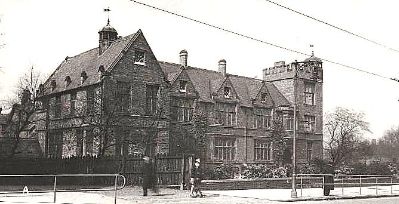
The headmaster at that time was Mr G L R Brown, whose often stern appearance disguised an essentially genial attitude towards all under his charge. His largely graduate staff taught pupils of both sexes who had been selected for grammar school education by means of the “Scholarship” or “Eleven-Plus” examination. Many of the pupils eventually progressed to university or teacher training college; some left earlier to embark on other useful careers, for it was Mr Brown’s stated aim that the School should above all turn out “good citizens”.
Two of the teachers at that time, Mr W R James, a chemist, and Mr Eric Rimer, a physicist, were also keen amateur musicians, and both were members of the Newcastle Bach Choir. This led them to encourage class singing in the school – but only for the girls and younger boys.
The real spark that set off the chain of events leading to the birth of the Caprians was ignited in 1945, when a pupil, Eileen Little (still singing with the Caprians in 2003 as Mrs Eileen Waistell), persuaded Mr James to form a school choir. This choir, consisting of senior girls, carried on successfully until 1949, when the next significant event in the Caprians’ story occurred.
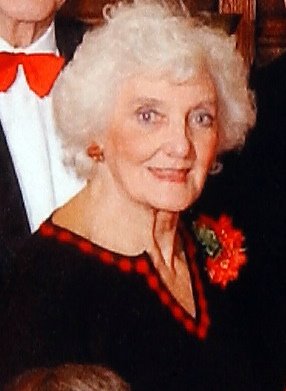
1949 Choir
This was the arrival at the school of a new Head of Mathematics, Mr Sydney Potts.
It is difficult to do justice to Mr Potts’ gifts and personality in a few short sentences. They are beautifully summed up in the obituary which the Headmaster wrote for the school magazine,after Mr Potts’ tragically early death in 1953, but this is sadly too long to reproduce here. Mr Potts’ personality was what today would probably be called “charismatic” – but in the best sense. It helped that he was tall, good-looking and still in his thirties
but there was much more to it than that.
He was an enthusiast. He loved mathematics, music and God in roughly equal measure, because he believed that God revealed himself through the former two. He talked to pupils about his enthusiasms, not like a teacher but more (as the Head wrote) in the friendly, bantering tone of an elder brother. He drew people around him, not least when he played the piano during lunch breaks. He could play in both the classical and jazz idioms, and before long he had inveigled some of the older boys who had come to listen to him into singing local dialect songs, student songs and spirituals. From here it was but a short step for the boys to join the school choir, singing tenor and bass to the girls’ soprano and alto. A mixed-voice choir was born.
Under Mr Rimer’s leadership, and with Mr Potts quipping outrageously from the piano, the choir began by tackling carols, hymns, student songs, spirituals and sea shanties. One of our favourites was the chorale “O Sacred Head, Sore Wounded”, by Mr Potts’ beloved J S Bach. An article in the school magazine for 1952 stated:
The Choir has a numerical strength of about one hundred. New recruits will be needed next year – boys and girls from Forms 4 to 6. This is a voluntary activity – there is no voice test – but members are expected to attend regularly. The primary objective of the Choir is to enjoy singing. Concerts are only a secondary consideration and are given when the Choir is ready for them.
We did give concerts, however – not only at school but also occasionally at outside venues. The programmes usually consisted of vocal and instrumental solos as well as choral numbers, and the boys and girls often performed separately. Mr Potts’ Boys’ Group was still thriving and some excellent soloists were emerging. When, in 1952, a 78-rpm record was made of the singing in the school, there were three religious pieces performed by the Choir on one side, and four much lighter pieces from the boys on the other side!
After the initial shock of Mr Potts’ death, the Choir carried on, with various talented pupil pianists taking on the accompaniments. During the next eighteen months we learned, among other shorter pieces, Buxtehude’s cantata “Alles, was ihr tut” (translated into English) and parts of Fauré’s Requiem. The girls’ section also made its own separate vocal contributions.
The Boys’ Group initially fell apart when Mr Potts was no longer there to lead them, but one of the soloists,
Alec Glasgow, asked me, whom he had known since junior school, if I would accompany and arrange for them. When I agreed, he recruited another seven boys from first-year sixth
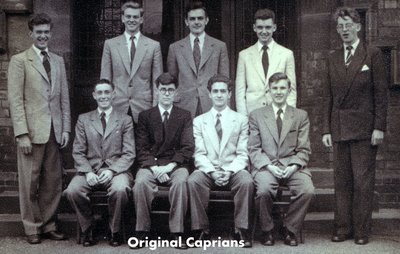
and we began rehearsing again during lunch breaks. We began by using Mr Potts’ arrangements and then added some other simple pieces arranged by myself. As a rule the arrangements used three-part harmony, with Alec singing the melody, supported by three tenors and four basses. Initially we called ourselves “The Small Group”, but quite soon we began using the more distinctive name, “The Caprians”. This was in 1953, hence the official Golden Jubilee in 2003.
People have asked repeatedly what the name “Caprians” means. Some
assume we have something to do with the Isle of Capri, and others,
mishearing the name, have called us “The Capricorns” and once even “The
Grampians”.
We have to explain to them that the school crest, in common with the Borough’s former coat of arms, featured a goat’s head. Adapting the Latin word for goat, the Classics Master named the school magazine “The Caprian”, and we, being lazy sixth-formers, looked no further.
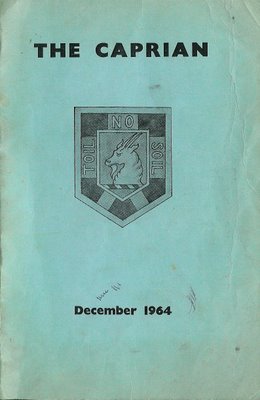
Most people listen politely to the explanation, glaze over and never ask again.
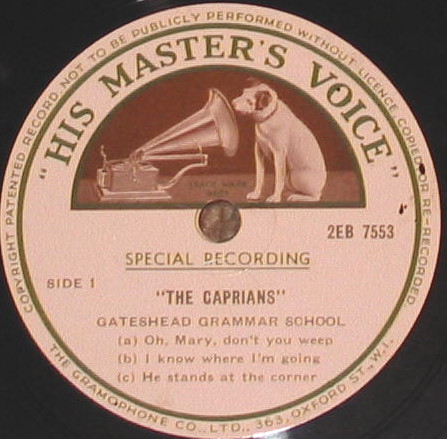
The Caprians contributed to school concerts, sang for church groups, Townswomen’s Guilds and the like outside of school, and in 1954 made a private 78-rpm disc recording with HMV. I believe we ordered 100 copies and sold the lot very quickly. Most have probably succumbed to the ravages of time by now, but fortunately several of us have a cassette version made from a relatively undamaged copy many years ago.
In 1954, all but one of the Caprians left school for university. Shortly before we dispersed, we gave a concert for Harlow Green Townswomen’s Guild, which resulted in a short review appearing in the “Gateshead Post”. It began: “I couldn’t help comparing the Caprians with the often-reported activities of so-called Teddy Boys”, said Mrs J L Liddle…and ended: “The Borough and their [sic] Grammar School can well be proud of these youngsters who selflessly devote their time to the enjoyment of others. Acts of this kind are to be welcomed among the youth of today.” Well, we might not have been Teddy Boys, but neither were we selfless – we enjoyed performing!
After School
During university vacations we always got together and sometimes gave concerts, to which some of the girls often came along to sing pieces of their own. In particular, we always joined forces on Christmas Eve to carry on the long-established tradition of carol-singing at the homes of teachers and parents. Travelling on foot, we would start at about 6pm on Lobley Hill and work our way over to Low Fell, usually finishing well after midnight. These carol-singing outings have continued unbroken to this day, though we now go out on 23rd December, travel by car and sing to friends – the teachers and most of the parents having long since passed on. We also sing at old people’s homes and sheltered housing units, though (with apologies to our younger members) we have so far refrained from putting our names on the waiting lists!
By 1958 most of us had completed our university and college courses and some had moved away to take up jobs in other parts of the country. Alec Glasgow, who had studied modern languages, went on to spend an extra year in Germany, where he got involved with local radio, made a German pop record, and returned in 1959 to begin a successful career as Alex Glasgow, broadcaster, singer-songwriter and playwright. Meanwhile, the rest of us continued to meet. The focus of our social life was now St George’s Badminton Club, on Durham Road. Two of the Caprians, Barrie Johnson and George Russell, and some of the girls were very good badminton players, and the rest of us would have a go when we were allowed to. The Club gave an annual concert at which Caprians, ex-GGS girls and club members joined forces to put on a programme which consisted of sketches, Caprians material, solos and other items, and usually concluded with a hefty dollop of Gilbert and Sullivan. We were ensured an audience and much was forgiven.
It was now high time, we felt, to establish a proper choir, rehearsing regularly and building up a concert repertoire. So in 1959 we found a practice room (the oddly named Derwent House, actually a large wooden hut behind the Victoria pub),

bought a second-hand piano for ten pounds, and were in business. After a few scruples about appropriating the name of the original boys’ group, we called ourselves – what else, really? – The Caprians. Almost without thinking, we continued the school choir’s open membership policy and accepted anyone who wanted to sing. This meant that the whole of the existing group, comprising ex-Grammar School pupils plus other members of the Badminton Club, joined the new choir. We decided to rehearse on Sunday evenings, as many members were otherwise engaged during the week, and it was certainly a treat to round off the weekend with a good sing before returning to the daily grind on Monday morning.
Thus was set the pattern that continued, with few modifications, for the next 44 years: Sunday rehearsals (now at St Mark’s Methodist Church), a dozen or so concerts a year and carol-singing at Christmas. Immediately ahead, however, were a few disconcerting bumps in the road.
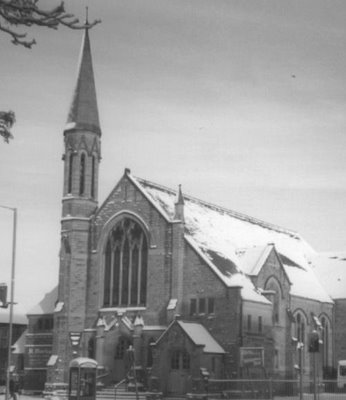
Changes of Conductor
In 1961, I decided to go to work in Germany.
For the first time, the group was left without a musical director. Fortunately, Valerie Wilson, one of our sopranos, was able to persuade her aunt, Mabel Wilson, to fill the post for a while. Mabel had considerable experience in adult education and was at that time lecturing at Newcastle University’s Institute of Education. She introduced the choir to new repertoire and new techniques of voice training, and was able to extend our range of concert venues. We even sang in the University’s King’s Hall itself.
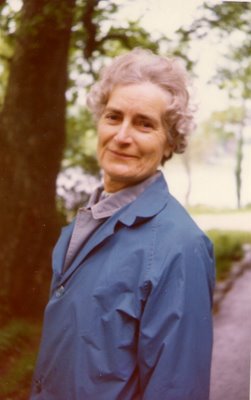
In 1963 I returned from Germany and rejoined the choir as a singer, but in 1964, when Mabel accepted a temporary teaching post in Canada, I again took over at the helm.
Not for long, however. In 1955 I was off once more, this time to work in Sheffield.
The choir now turned to an excellent musician who had already heard the choir sing and had expressed his approval. This was Paul Abbott, who was then working as concert manager for the Northern Sinfonia. During his tenure as Musical Director of the Caprians, Paul greatly improved the choir’s vocal quality and general musicianship. Without abandoning the existing lightish repertoire (which he enjoyed), he introduced more
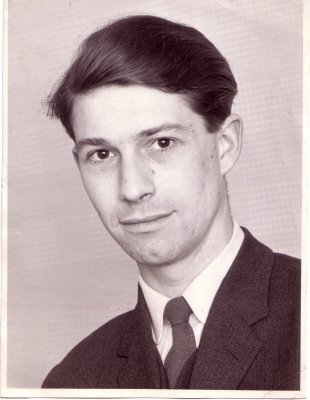
demanding, classical material, which the group certainly needed at that stage if it was to advance in technique. However, by 1971, Paul’s other commitments, not least as conductor of the Newcastle Festival Chorus, made it impossible for him to continue with the Caprians.
Luckily for me, I was now back in the area, so was able to accept the choir’s invitation to take over again, which I did in 1972. I am still here 31 years later.
Luckily for me, I was now back in the area, so was able to accept the choir’s invitation to take over again, which I did in 1972. I am still here 31 years later.
The Choir Since 1972
Since 1972 the Caprians’ progress has been relatively stable. The size of the choir has remained fairly constant at around twenty, the number and type of concerts haven’t greatly changed (though there have been some interesting developments), and the ever-important social activities have continued and become more varied.
Inevitably, over the years members have come and gone and been replaced by others, so it is all the more remarkable that we still have eight ex-Gateshead Grammar School pupils singing with us. Of these, two deserve an honourable mention for their astonishing record of long service. Richard Soper was one of the original all-male Caprians in 1953 and has sung with us without a break for 50 years. On the female side, Pat Johnson, though excluded by her sex from the original group, ‘sang along with us’ in the early years before becoming an ‘official’ Caprian in 1959 – so she too can claim the 50 years service badge. Some members have left and rejoined later, notably Ian Wells, one of the original Caprians, who has recently returned to the choir after a long period of absence, during which he has made a big name for himself in local and national amateur operatic and dramatic circles.
Our newer members have brought to us both vocal quality and musical experience. Both of our present tenors, for example, were recruited from Newcastle Bach Choir, 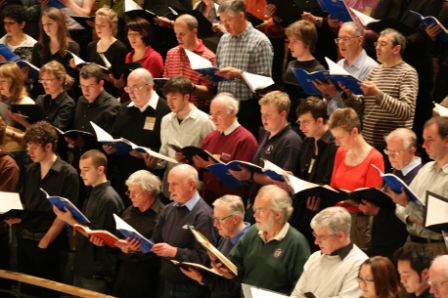
Image from Newcastle Bach Choir website
with which we still have many links. Vera Wilson has sung with the Bach Choir since her early twenties, as did the late Valerie Wilson. At one point recently no fewer than ten Caprians, including almost the entire alto line, were ‘in the Bach’. Some of our members also sing with other choirs, such as the St Mary’s Singers at Ponteland, the Cappella Novocastriensis and the St Thomas’ Singers. A number of years ago, Vera Wilson was a member of the London-based Malcolm Sargent Festival Choir, giving concerts at the Albert Hall and touring in Australia and Italy.
Members’ connections with the amateur stage have also been extensive. Back in 1965, several Caprians formed the Caprian Amateur Operatic and Dramatic Society, presenting “Salad Days” as their first show. The Society still thrives, though with a different membership. There have also been strong links with the Felling Society. At present, our youngest member, Karen Aynsley, has earned great praise for her performances of leading roles in musicals for various Tyneside societies.
Another important link with the Bach Choir has been its excellent accompanist, June Reed, who has also accompanied for us at most of our major concerts. We owe her a great debt of gratitude. If anyone qualifies to be considered an ‘honorary Caprian’, it is June.
In Memoriam
It is perhaps fitting at this point to record with sadness the deaths of some of our members and ex-members; - Paul Abbott in 1979; Stan Snowdon, our first Treasurer, in 1982; Mabel Wilson in c1986; Valerie Wilson in 1992; Angela Blenkinsop in 1993; Joy Bolton; John Hawkins in 1995; June Hird in 1997; Carol Robson; Barrie Johnson and Alex Glasgow in 2001. There may have been others. We also remember with great affection that indomitable lady, Mona Wilson, Valerie’s mother, who, though not a choir member, was a fiercely loyal supporter of the Caprians until her death, aged 99, in 2001.
Concert Engagements
Since 1972 we have kept records of all our concert programmes, though there are unfortunately quite a few gaps before that date. Working from these records, I have calculated that the choir has given well over 400 concerts at more than 200 venues ranging from Beadnell in the north to Sinnington, near Pickering, in the south, and from Henshaw, near Bardon Mill, in the west to Scarborough in the east. The main highlights have been:
• Our contributions to the Gateshead Grammar School Old Students Association concerts at the Shipley Art Gallery in 1959 and 1960.
• A concert for Gateshead Music Society in 1965, also at the Shipley Art Gallery, at which the programme included an arrangement of Bach’s “Peasant Cantata”, with Valerie Wilson and Brian Scraton as soloists.
• A concert given jointly with the Caprian Amateur Operatic and Dramatic Society at Dryden School in 1968, at which the programme included Bach’s “Coffee Cantata”, with Jane Welsh, Richard Price and Dennis Weatherly as soloists.
• The Caprians’ 21st Anniversary Concert at the Shipley Art Gallery in 1974, at which Paul Abbott returned as guest conductor in the “Five Herrick Songs” by John Clements.
• A Gateshead Arts Association concert arranged for the Queen’s Silver Jubilee at the Caedmon Hall in 1977. This was the first of a series of regular, though not annual, concerts at the Caedmon, some for the Arts Association and others self-promoted.
• Also in 1977, the first of our “Christmas Words and Music” performances, which have proved very popular in churches throughout the region, and which continue to this day.
• The Caprians’ 25th Anniversary Concert at Gateshead Technical College in 1978, at which we sang a nostalgic song, “Time to remember”, specially written for the occasion by Alex Glasgow.
• Several appearances at the National Garden Festival held in Gateshead in 1990.
• The Caprians’ 40th Anniversary Concert at the Caedmon Hall in 1993.
Of course, many of our smaller concerts were also ‘highlights’ in terms of enjoyment and audience appreciation, but these are far too numerous to list here.
Recordings
The Caprians have made several recordings. Of these, the 1954 disc made by the original group has already been mentioned. In 1969, a live concert of folksongs, and later some Christmas carols, were recorded by Radio Durham. Then in 1975, Tyne Tees Television made a special sound-only recording of a number of religious songs for their “Epilogue” programme, which was broadcast late on Sunday evenings.
The first recording made for sale to the public was “Another day to sing”, an audiocassette issued in 1987. This contained a representative selection of Caprians numbers, including solo material. Hard on its heels followed

“Christmas with the Caprians” (1989), compiled from tracks recorded at various “Words and Music” concerts over the years. In 2000 we issued another specially recorded cassette, which we called “A Caprian Kaleidoscope”,
and in 2002, following up an idea of Jean Hedley’s, we brought out a double-CD album entitled “Songs of the North East”. This began with some tracks from the original Caprians record of 1954 and included many live performances from 1977 onwards as well as some specially recorded items
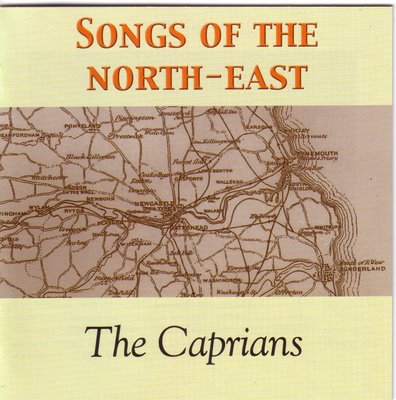
Social Activities
Although music making is naturally the main purpose of the choir, singing together has also had the happy effect of creating a group of friends who look for other opportunities of getting to know one another. Over the years we have developed quite a rich variety of social activities, beginning with annual dinners in the early years and then switching to gatherings in each other’s houses, with catering on the ‘bring and share’ principle. One of our favourite events is the ‘Soirée’, held every summer, at which individual members (entirely voluntarily!) perform a ‘turn’, not necessarily musical, and where future concert material sometimes makes its first appearance.
Our “Desert Island Discs” series has also proved very popular and, at one period, fancy dress parties were all the rage. In 1976 (that year of wonderful weather), we had our first summer outing and have continued with them since then, visiting local beauty spots, the Lake District and, more recently, stately homes such as Castle Howard and Harewood House. In 2000 and 2001 we celebrated both the false and the true start of the new millennium with a long week-end at the Crieff Hydro Hotel and liked the experience so much that we continued in the following two years with winter breaks at the Lodore Hotel in Borrowdale, and at Peebles Hydro. I am sure that social events such as these will continue, even when our voices finally fail.
Fifty Years On
And so we reach our 50th anniversary. We are delighted to see in the large audience this evening not only our regular loyal supporters but also a large number of former Caprians and Gateshead Grammar School pupils, many of whom have travelled considerable distances to attend both this concert and yesterday’s School Reunion, so ably organised by Pat Johnson. After the performance tonight, Caprians past and present will be meeting nearby for a drink and a chat, and I am quite sure that among all the shared reminiscences will be vivid memories of the talented and enlightened teachers who fostered in us a love of music that has perhaps proved even stronger than they would have imagined. This Golden Jubilee is a tribute not only to the staying power of the Caprians, but also to the quality of education which some of us in Gateshead enjoyed half a century ago.
